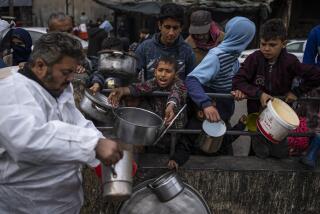Besieged Bosnians Cannot Eat a Symbol : Clinton’s timid airdrop will do little to aid the starving
- Share via
When starving the enemy is the military tactic of choice, anyone who takes food to the enemy intervenes militarily. Starving the Muslim enemy has been a key Serb tactic in eastern Bosnia. Accordingly, the Serbs have treated U.N. humanitarian relief to Muslim towns in the area as a hostile act.
Last week, Bosnian President Alija Izetbegovic, recognizing that he was more than the mayor of Sarajevo, announced that further U.N. relief for that city would be refused until relief reached the east. The citizens of Sarajevo supported his announcement with poignant unanimity.
But the demonstration failed. U.N. High Commissioner for Refugees Sadako Ogata first suspended all U.N. relief operations, alleging that political interference with the operation had made a mockery of it. Then U.N. General Secretary Boutros Boutros-Ghali overruled her, reinstating the operation in principle without instituting any new measures to break through the Serb blockade. Then President Clinton half-overruled him by announcing that the United States and unnamed allies (there now appear to be none) were planning an airdrop of relief in eastern Bosnia.
Armed enforcement of aid deliveries is just what Bosnia needs. Wednesday, however, after consultation with Boutros-Ghali, Clinton downgraded the airdrop to a one-time, largely symbolic delivery of relief to Serbs, Croats and Muslims alike. In eastern Bosnia, C-130 transport planes unsupported by either ground troops or combat aircraft will drop their cargo near the besieged Muslim towns--that is, in territory held by Serb ground troops--and simply hope the Muslims get some of it. Renegade Serbs may still fire on the planes, but they have little reason to do so. The larger part of the airdrop is likely to fall into their hands anyway.
Clinton says that the airdrop “has no combat connotations whatever and it’s purely humanitarian and quite limited.” In truth, the airdrop is so limited that even its humanitarian impact will be slight. But if it guaranteed large-scale relief to the Bosnian towns, its combat connotations would be inescapable. Whether or not the President knows that, the U.N. peacekeepers do.
Sixteen UNPROFOR (U.N. Protective Force) soldiers have already been killed and 100 wounded despite their adherence to the orders of Lt. Gen. Philippe Morillon, their commander, against armed enforcement of relief deliveries. Legally, the U.N. forces are authorized to use “all necessary means” to protect relief shipments, but the “necessary means” amount quite literally to war, and neither the Europeans nor the Americans are willing to employ such means. The new airdrop does not use the “necessary means” any more than overland convoys have. An effective airdrop would be from an elevation of 400 feet. To avoid Serb fire, the Clinton airdrop will fly in at 10,000 feet.
The Europeans want no military action in Bosnia without major U.S. participation. The United States, regarding the U.N.-European Community peace plan as militarily unenforceable, promises its forces only at some, in effect, distant date when negotiation unassisted by military intervention will have produced agreement on a better plan. The Serbs have been given, as a result, an ever freer hand. And the Clinton gesture, however well-intentioned, will not change that situation in the slightest.
More to Read
Sign up for Essential California
The most important California stories and recommendations in your inbox every morning.
You may occasionally receive promotional content from the Los Angeles Times.













